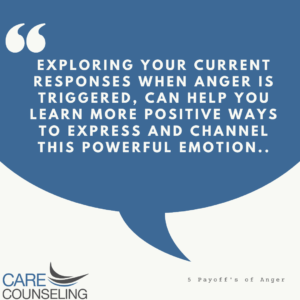 5 Anger Payoffs: Anger with a Spouse or Intimate Partner(s)
5 Anger Payoffs: Anger with a Spouse or Intimate Partner(s)
Anger is an important emotion, that has both positive and negative consequences. While each person’s thought processes and emotional expression of anger will look different, I’d like to provide some common examples that illustrate the payoffs of anger. Here is the setup:
Who: partner(s)
What: anger & anger’s payoff
When & Where: triggering situations/ circumstances
Why: anger expressed in hurtful ways
How: Stay tuned for my next blog which will address strategies that can be used in each of the scenarios to express anger in more productive ways that can strengthen the overall relationship.
Let’s look at five different scenarios that incorporate anger payoffs. All the examples involve a spouse or intimate partner(s), although similar examples can generalize to other relationships with family/ children, friends, and co-workers.
Anger Reduces Stress
Scenario: Your partner has lied to you again, and you are angry! You can’t stop thinking about what they did and the steps that were taken to keep this information from you. You can feel your blood pumping as you replay the scenario in your mind. You sit there in silence, trying to process and all you feel is raw anger. You can feel your body on the verge of a breakdown. You can’t take it anymore and “lose it”. You feel better temporarily but realize that the underlying problems in the relationship haven’t changed and you are “losing it” more often.
Anger Masks Underlying Pain
Scenario: You have endured a lot of pain and hardship in your life, but life goes on. You have a lot of responsibilities—taking care of yourself and your family. You “go through the motions”, working hard and keeping your feelings to yourself. Suppressing emotions or numbing them with drugs or alcohol are your go-to coping strategies. It is tough to be vulnerable with your partner and intimacy has been tough with patterns of shutting down and irritability. Anger is used to mask the underlying pain.
Anger Gets Attention
Scenario: You and your partner have been having communication issues in your relationship for a while now. You feel miserable in the relationship. You have been in individual therapy for a period and your partner is finally willing to give couples therapy a try. In your first couples’ session, you feel as though the therapist is siding with your partner as the therapist is validating your partner’s feelings. You notice yourself becoming defensive, interrupting your partner to “correct them”. You are so angry and notice that your voice is raised (maybe yelling?) as the full attention in the room is on you. You want to feel heard and understood.
Anger Seeks Revenge/ Punishment
Scenario: Your ex ended the relationship, leaving you to “pick up the pieces” as you struggle to find alternative housing, pay the bills, and figure out what to do with shared assets. Recently you learned that they are planning to move out of state to be in a new relationship. How dare they just “move on” with their life! You begin planning how to make them pay for all the pain they put you through. You are not ready to move on. You want to seek revenge.
Anger Changes Others
Scenario: Your partners have been spending a lot of time together and you are feeling left out, feeling insecure about your relationship. You are feeling angry, demand your unmet need be met, and express that you are reconsidering the terms of the relationship. Your partners adjust plans to accommodate your needs but how it was communicated felt manipulative. You seek to change the situation, but perhaps there could have been another option if you hadn’t acted in a moment of anger.
As you can see, all these options have payoffs—they help you meet needs but when expressed in negative ways, they often only make things worse. Beginning to understand the triggering situations and circumstances and exploring your current responses when anger is triggered, can help you learn more positive ways to express and channel this powerful emotion.
It is important that you and your partner(s) feel physically and emotionally safe in the relationship. Resources such as the hotline are available as support. If you are struggling with anger, consider individual therapy as the next step to help strengthen your relationships.
Written By: Charlotte Johnson, MA, LPCC
We’re Here to help
Our wellness experts will be happy to take care of you. You can CLICK HERE to schedule an appointment now or call (612)223-8898.
Meet Clinicians
We’re united by our commitment to providing effective, relevant, and innovative mental health support at all stages of your journey. Click Here to find a therapist or find out more about who we are, where we come from, and how we live out CARE’s mission every day.
The professionals at CARE are actively collecting and creating resources to help with what you need and address frequently asked questions. We’re Here for You.



